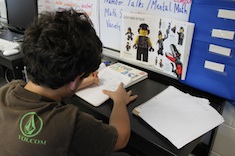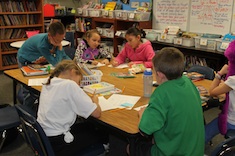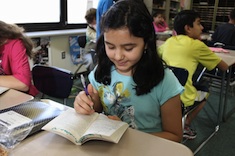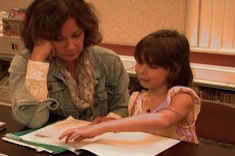
If you are familiar with David Shannon’s book David Goes to School, it is clear that he served as a mentor for young writer Aaron. Aaron emulated the way David Shannon draws characters. He also created the setting, adding the classroom windows with the morning sun streaming into the classroom. Aaron added details like the pencil and paper, and included emotion in his illustration. Aaron’s text reflects the text in David Goes to School, and Aaron cut out the three-lined paper, just like David Shannon. As a first grader, Aaron was developing an understanding of how to use a mentor text as a writer.
In addition to providing students with mentors for craft and conventions, like David was to Aaron, it is important to provide students with mentors for the writing process and writing habits. For example, when students learn that David loves his dog Fergus, and puts Fergus in each of his books, this allows them to adopt a writing habit like David. Of course they don’t put Fergus in their books (well, some of them do and then need to be nudged to make it more personal), but they choose something important from their lives and add it to their illustrations.
Providing students with mentors for writing process and habits makes for a more complete mentorship. Here are some ways to connect your students to mentors for writing process and habits.
Author Talks
Listening to authors talk is a treasure. I am enamored with the quirks and routines of writers. I loved hearing Patricia MacLachlan talk about her love of the prairie. I watched her dig into her jeans pocket and pull out a sandwich baggie full of prairie dirt. “I take it everywhere I go,” she said. It’s one of the best pieces of encouragement I have for students who write about the same topic over and over and over again.
“You write just like Patricia MacLachlan,” I tell students. “She even carries prairie dirt wherever she goes!” Then I encourage students to write about their favorite topics in different ways, just like Patricia MacLachlan.
My husband traveled with me to Traverse City, Michigan, a five-hour road trip, just so I could hear Maggie Stiefvater speak. “Here’s my writing notebook,” she said, and held up her hand. Black Sharpie marks were scribbled all over her hands. “Sometimes it goes up my arms, too,” she said. “It just depends on how many ideas I need to keep.”
Stiefvater doesn’t keep a traditional writing notebook, but she still collects her ideas and keeps them until she needs them. “When I realized the ending to my last book, I had to be careful not to scrub my hand too hard or else I would have washed it away before I had it written!” I’ve known a lot of kids who have tried Stiefvater’s version of collecting ideas by scribbling on their hands. You can view lots of interviews with authors at this link.
Book Savors
Mary Helen Gensch has curated websites and videos of authors sharing about their processes and habits. It is a resource that will save you time because you can quickly find information about your students’ favorite writers. Gensch has cataloged 30 authors with links to videos. This is the next best thing to attending an author talk: bringing the author into your classroom!
Sharing Our Notebooks
Amy Ludwig VanDerwater collects notebooks from a variety of authors, professional writers, teachers, and kids. You can find notebooks and explanations written by different authors on her blog. I always leave a visit to Sharing Our Notebooks with another way to help students individualize the writing process.
What a Writer Needs
What a Writer Needs by Ralph Fletcher is a classic professional book about the way writers work. The chapter about mentors shifted my practice. A second edition of What a Writer Needs was recently released. It is worth the read for anyone who would like to know more about the way writers work.
Expanding the way we approach talking about writing mentors with students is a first step. Fletcher writes, “We need to think hard about how we talk about writing—to our colleagues, to our students, to ourselves.”
The more we hear authors talk about their writing processes and habits, the more we learn how to talk as writers during writing workshop. These websites and books are great tools for doing that every day in writing workshops.









